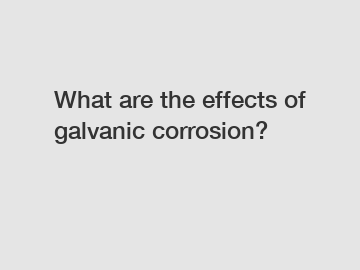What are the effects of galvanic corrosion?
What are the effects of galvanic corrosion?
Galvanic corrosion, also known as dissimilar metal corrosion, occurs when two different metals come into contact in the presence of an electrolyte, such as moisture or saltwater. This electrochemical process allows the more anodic metal to corrode while protecting the cathodic metal. Galvanic corrosion can have several significant effects on various materials and structures, leading to potential safety hazards and costly repairs. In this article, we will delve into the effects of galvanic corrosion and understand its implications in different industries.
1. Destruction of Metal Structures.

Galvanic corrosion poses a serious threat to metallic structures, especially when they are exposed to harsh environments and electrolytes. When dissimilar metals are in contact, an electrochemical cell is created, where one metal acts as an anode and therefore corrodes more quickly, while the other serves as a cathode and remains protected. Over time, this corrosion can weaken the structural integrity of buildings, bridges, pipelines, and other metal-based constructions, compromising their safety and potentially leading to catastrophic failures.
2. Degradation of Electrical Systems.
Galvanic corrosion can also impact electrical systems, particularly when connections between different metals are involved. In electrical circuits, dissimilar metals connected through conductive pathways can create galvanic cells, resulting in corrosion. This corrosion can lead to increased resistance, poor conductivity, and ultimately, the failure of electrical equipment. In critical applications such as aerospace and automotive industries, the effects of galvanic corrosion on electrical systems can be particularly hazardous and may result in unexpected malfunctions or accidents.
3. Damage to Marine Vessels.
The marine environment is notorious for its corrosive nature, and galvanic corrosion can wreak havoc on metal structures in ships and boats. With various metals used in marine vessels, such as steel, aluminum, and brass, the risk of galvanic corrosion is high. Without proper insulation and protective measures, the dissimilar metals in contact with seawater can quickly degrade, leading to pitting, fouling, and even hull perforation. Regular maintenance and the use of sacrificial anodes can help mitigate the effects of galvanic corrosion in marine applications.
4. Deterioration of Metal Coatings.
Galvanic corrosion can also impact the effectiveness of protective coatings applied to metals. When dissimilar metals are present under a coating, the difference in their electrochemical potentials can cause galvanic cells to form. These cells accelerate the degradation of the coating, leading to premature failure and exposing the underlying metal to corrosion. This is particularly concerning in industries where coatings are vital for preserving the integrity and lifespan of assets, such as oil and gas pipelines or automotive bodies.
In conclusion, galvanic corrosion can have significant effects on various materials and structures, jeopardizing their functionality, safety, and longevity. It is crucial to understand the potential risks associated with dissimilar metal combinations and implement preventive measures to minimize galvanic corrosion. Proper insulation, the use of compatible materials, and the application of protective coatings or sacrificial anodes are all strategies that can help mitigate the damaging effects of galvanic corrosion.
If you require further guidance or assistance regarding galvanic corrosion and its prevention, do not hesitate to contact us. Our team of experts is here to provide you with the necessary expertise and support to safeguard your assets from the detrimental effects of galvanic corrosion.
For more information, please visit Rubber Dam Manufacturers, hydraulic elevator dam supplier, Containerized Water Purification Plant supplier.
303
0
0

Comments
All Comments (0)